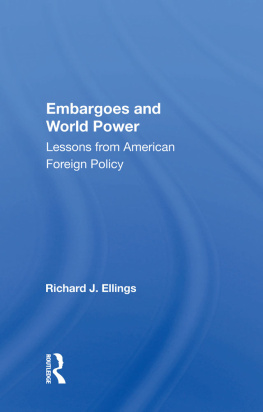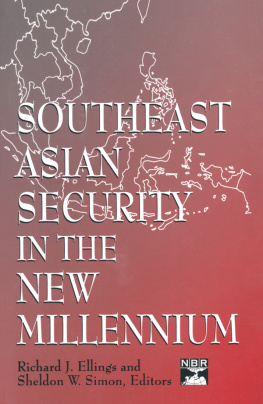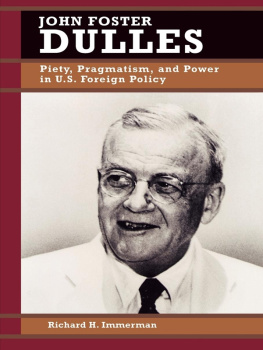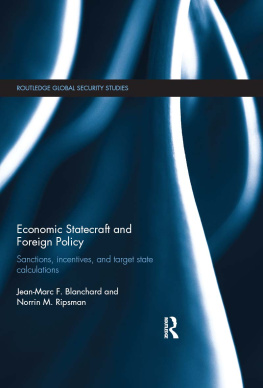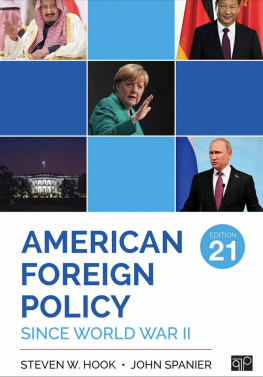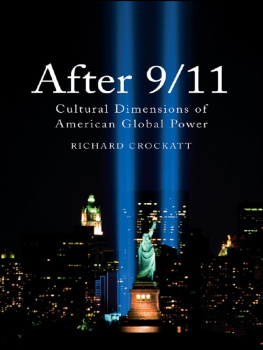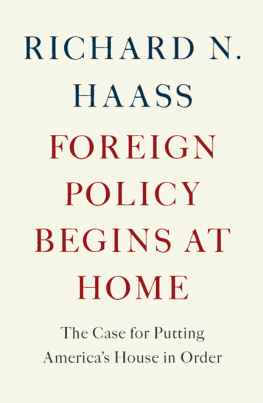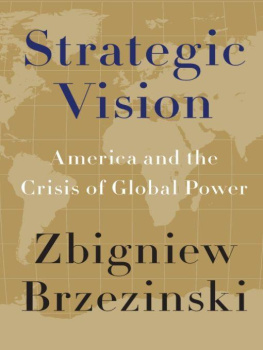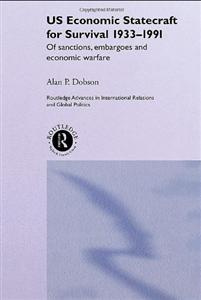Richard J. Ellings - Embargoes and World Power: Lessons From American Foreign Policy
Here you can read online Richard J. Ellings - Embargoes and World Power: Lessons From American Foreign Policy full text of the book (entire story) in english for free. Download pdf and epub, get meaning, cover and reviews about this ebook. City: New York, year: 1985, publisher: Routledge, genre: Science / Politics. Description of the work, (preface) as well as reviews are available. Best literature library LitArk.com created for fans of good reading and offers a wide selection of genres:
Romance novel
Science fiction
Adventure
Detective
Science
History
Home and family
Prose
Art
Politics
Computer
Non-fiction
Religion
Business
Children
Humor
Choose a favorite category and find really read worthwhile books. Enjoy immersion in the world of imagination, feel the emotions of the characters or learn something new for yourself, make an fascinating discovery.
- Book:Embargoes and World Power: Lessons From American Foreign Policy
- Author:
- Publisher:Routledge
- Genre:
- Year:1985
- City:New York
- Rating:3 / 5
- Favourites:Add to favourites
- Your mark:
- 60
- 1
- 2
- 3
- 4
- 5
Embargoes and World Power: Lessons From American Foreign Policy: summary, description and annotation
We offer to read an annotation, description, summary or preface (depends on what the author of the book "Embargoes and World Power: Lessons From American Foreign Policy" wrote himself). If you haven't found the necessary information about the book — write in the comments, we will try to find it.
Embargoes and World Power: Lessons From American Foreign Policy — read online for free the complete book (whole text) full work
Below is the text of the book, divided by pages. System saving the place of the last page read, allows you to conveniently read the book "Embargoes and World Power: Lessons From American Foreign Policy" online for free, without having to search again every time where you left off. Put a bookmark, and you can go to the page where you finished reading at any time.
Font size:
Interval:
Bookmark:

52 Vanderbilt Avenue, New York, NY 10017
2 Park Square, Milton Park, Abingdon, Oxon OX14 4RN
Product or corporate names may be trademarks or registered trademarks, and are used only for identification and explanation without intent to infringe.
Ellings, Richard.
Embargoes and world power
(Westview special studies in international relations)
Bibliography: p.
Includes index.
1. United StatesForeign relations1945- .2. EmbargoCase studies. 3. Sanctions (International law)Case studies. I. Title.
E744.E44 1985 327.73 85-3336
ISBN 13: 978-0-367-00670-9 (hbk)
- ii
- iii
- CoCom Coordinating Committee for Multilateral Export Controls
- DOD Department of Defense
- EC European Community
- F.R.G Federal Republic of Germany
- FEA Foreign Economic Administration
- GATT General Agreement on Tariffs and Trade
- G.D.R German Democratic Republic
- GNP Gross National Product
- IMF International Monetary Fund
- LDC Less Developed Country
- MNC Multinational Corporation
- M.P.R. Mongolian People's Republic
- NATO North Atlantic Treaty Organization
- NYT New York Times
- OAS Organization of American States
- OPEC Organization of Petroleum Exporting Countries
- P.R.C. People's Republic of China
- SITC Standard International Trade Classification
- TAC Technical Advisory Committee
- U.S.S.R. Union of Soviet Socialist Republics
- U.A.R. United Arab Republic
- U.K. United Kingdom
- UN United Nations
- U.S. United States
- WP World Product
Font size:
Interval:
Bookmark:
Similar books «Embargoes and World Power: Lessons From American Foreign Policy»
Look at similar books to Embargoes and World Power: Lessons From American Foreign Policy. We have selected literature similar in name and meaning in the hope of providing readers with more options to find new, interesting, not yet read works.
Discussion, reviews of the book Embargoes and World Power: Lessons From American Foreign Policy and just readers' own opinions. Leave your comments, write what you think about the work, its meaning or the main characters. Specify what exactly you liked and what you didn't like, and why you think so.

